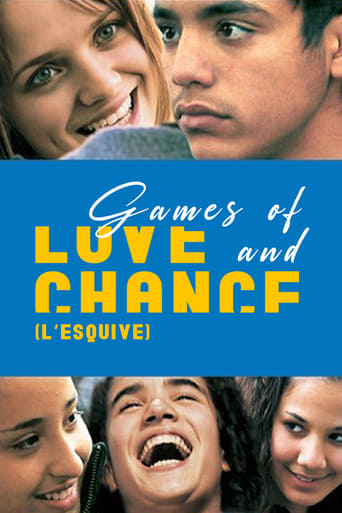nmegahey
Abdellatif Kechiche's L'Esquive focuses on the less than glamorous lifestyles of the kids in the Parisian suburban 'banlieue'. Its low-budget, shaky hand-held gives the impression of realism, as does the ghetto-speak delivered by the young mostly non-professional actors, but I doubt that most impoverished, minority race Paris suburban youths consider rehearsing 18th century plays as their preferred outdoor leisure activity.That might give some indication of just how heavy-handed L'Esquive is, a school production of Marivaux's 'Games of Love and Chance' being shoehorned in to draw parallels on how social divisions and prejudice are not just tolerated, but actively enforced by the society and the authorities to the extent that those repressed come to believe that they aren't deserving of anything more. The use of language meanwhile is used to compare and contrast those social divisions and attitudes, showing in the process that essentially, people are pretty much the same regardless. Just in case you don't get it though, a police squad swoops down at the kids at one point to make sure they know their place and don't get any ideas above their station.It's a relevant subject and one of particular social significance at the time the film was made, leading the Césars to shower it with awards for tackling such edgy material. Any good social points the film has to make however are negated by its storytelling and film-making deficiencies. In addition to being heavy-handed, it's tedious in the extreme - a banal, badly-acted story of attraction between profoundly irritating ghetto kids bickering at the tops of their voices for what feels like an interminable two-hours.
Andres Salama
This French film is a quite disheartening look at life in the public housing projects outside Paris. In a crumbling neighborhood with a majority of immigrants from Northern Africa, a high school tries to produce a play by Pierre Marivaux (1688-1763). The heart of the film is the budding romance between the vivacious blonde Lydia (one of the few "native" French living in the neighborhood) and the shy and painfully inarticulate Krimo, who is ridiculized by his thuggish friends for taking a part in the play. All the kids speak in an unintelligible slang, which makes a contrast with the classical French of Marivaux. I wrote it was disheartening (despite not being a drama) because it shows that the marginalized inhabitants of the projects have an almost nil chance of breaking into the mainstream of French society. Thoughtful and worth seeing.
rg
This is one of those films that'll cause you to wonder just how it made it past the critics alive -- and if your spouse will ever again agree to "watch something French" with you! Jerkily filmed, peopled by endlessly foul-mouthed street louts, and ruthless in its examination of the utterly banal, this film will be a puzzle to most who decide to take it home from the video shop. Perhaps its original allure was in its multi-ethnic cast and the warm and fuzzy resonance multicultural themes always elicit among left-ish film critics. The troubles now endemic to her low-rent ethnic suburbs may cause the French to re-evaluate their initial enchantment with this film. Non?
randolphtaco
This movie is getting fresh exposure in France thanks to its win at Les Césars, or the "French Oscars" as other countries like to call them. Its success will probably mean that it now gets exposure outside the country, too, and I wonder how successfully.Though an accurate and contemporary examination of France, the film's world is a foreign one, even to many people living here--the specificity of the setting (the projects, in a "suburb" of Paris), the language (rapid-fire, slangy, "vulgar", and peppered with "verlan", a street language of inverted syllables--the word itself could translate as "wardsback", and how anyone will translate this dialogue I have no idea), and the behavior (mostly arguing--strident, pushy, beautifully repetitive) may not play clearly outside of France. I'm not sure how clearly it plays here, or how willing people are to watch it, especially as it turns the idea of the scary bad French projects somewhat on its ear.This isn't a criticism of the movie; on the contrary. Kechiche has shot a riveting cross-section of teenagers growing up in social housing, in broken homes and poverty, who lack the tools of expression, and who have adopted the posturing of the wounded (and, in the story, almost entirely absent) adults who raise them, attacking (the movie unfolds at a near-constant level of verbal aggression) and dodging ("esquiver" means "to dodge" or "to evade") one another's attacks with all they can muster.The film's intensely political side feels almost accidental; in its unfolding, it has great heart, and its actors, who are apparently mostly amateurs from around the shooting location, are outstanding. On the whole, it reminded me a great deal of David Gordon Green's George Washington: a simple love story set against a landscape of poverty, played out frankly and honestly, allowed to unfold at a distinctly un-Hollywoodian rhythm. If Green's film is more beautiful cinematic ally, L'Esquive is more concentrated, more unflinching in its examination of the deep repercussions and violence of economic, social, and familial hardship. Its statement that France is no longer a country of the French-of-French-ancestry, and that its refusal to accept its own transformation does not mean its lost generation accepts its loss, could not be more clearly nor more poignantly made.Without spoiling or going into detail, there are things about the plot that are implausible, things that probably hurt the film overall, but watching this movie for plot is like watching Ocean's Eleven for social insight. This is a positive study of character in a bad situation, of a stratum of society rarely filmed and still more rarely treated as fairly as it is offered up here, beautifully and eloquently.
